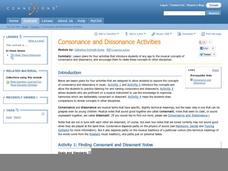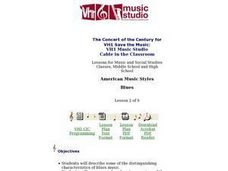Curated OER
Music and Emotion
Students identify the various emotions created by different types of music. They Identify role of music in creating various emotions for film and television . They observe and practice various ways of playing percussion instruments. They...
Curated OER
Consonance and Dissonance Activities
Hone those musical ears to identify consonance and dissonance in music being played live or on a recording. Learners will work through four activities where they will listen to consonant and dissonant notes being played first by the...
Curated OER
Grand Staff - 3
In this grand staff worksheet, students read the sheet music and identify the musical notes that are missing as they fill in 94 blank spaces.
Curated OER
Grand Staff - 4
In this grand staff worksheet, students read the sheet music and identify the musical notes that are missing as they fill in 94 blank spaces.
Curated OER
Grand Staff - 5
For this grand staff worksheet, students read the sheet music and identify the musical notes that are missing as they fill in 94 blank spaces.
Curated OER
Grand Staff - 1
In this grand staff worksheet, learners read the sheet music and identify the musical notes that are missing as they fill in 98 blank spaces.
Curated OER
Grand Staff - 2
In this grand staff worksheet, students read the sheet music and identify the musical notes that are missing as they fill in 98 blank spaces.
Curated OER
Music of My Heart
Pupils view and discuss the movie, Music of the Heart. They compare/contrast two versions of the song, Music of My Heart, identify characteristics of heroes, and sing the song, Music of My Heart.
Curated OER
American Music Styles: Blues - Lesson 2
Students describe some of the distinguishing characteristics of blues music. They compare and analyze two versions of the same 12-bar blues song. They read and identify notation symbols for rhythm and tempo.
Curated OER
Focus on Harmony
Harmony is the focus of this band lesson plan. Upper graders play the Star Spangled Banner, while focusing on harmony, chords, and musical voice. This lesson plan includes several suggested cross-curricular activities.
Curated OER
Butterflies Fly!
Chopin was a lovely composer who played the piano masterfully. Third graders are introduced to Chopin, his piano sounds, triple meter, music patterns, movement, and the waltz. They listen to his music while hearing the story Butterflies...
Curated OER
Rhythm, Triads, Intervals
Let the class show what they know about rhythm, triads, and intervals with this quiz. They complete the rhythm on staff one and two, identify the intervals on staff three, and identify the triads on staff four. This is a well-thought-out...
Fun Music Company
Treasure Island Clues: Rhythm
Designed for rhythm level 1, the two games in this packet ask young musicians to identify the number of beats represented by a series of notes and notations, and then to use those numbers to answer a music trivia question.
Curated OER
General Music: Star Spangled Banner
"The Star Spangled Banner" became our country's national anthem, but why? Second and third grade musicians read about the song, analyze the lyrics, and discuss patriotism. They then complete a related word search.
Curated OER
Music Composition
Students compose a simple melody using the notes of the D Major Scale. Criteria/Rubric for evaluation is provided with variations depending on skill level of students. A minimum of one forty-five minute class period is needed for this...
Curated OER
Student Composers with Music Ace
Students compose short compositions using Doodle Pad. For this Musical composition lesson, students a clef and note lines to prior knowledge of the treble clef and note lines to write short songs on the computer. Students use Music Ace...
Fun Music Company
Compound Time
To demonstrate their understanding of simple and compound time signatures, young musicians complete a chart by drawing quarter or dotted quarter notes equal in value to the note groups shown.
Fun Music Company
Working Out the Key
"Gimme an E minor!" Or any key for that matter. But how do you figure out the key of a piece of music? Here's a worksheet that shows young musicians three easy steps to help them identify the key of a piece of music.
Fun Music Company
Classification of Intervals
Major 2nd, Perfect 4th, Minor 3rd. The number and classification of intervals are the focus of a one-page worksheet that asks musicians to write the intervals above given notes and to indicate the classification of others.
VH1
Lessons for Hight School Music Classes: Lesson 2
Art and music have been vehicles for statements of civil unrest for hundreds of years. Upper graders critically analyze several pop songs or music movements from the 1980s that exemplify politically charged motives. They analyze lyrics...
Perkins School for the Blind
Learning to Identify Sounds Made by the Body
Sneeze, snap, tap, and whistle; Did I do that? Explore the parts and sounds of the human body with your learners with visual impairments. First you'll name the parts of the body, make a sound with each part, and then have the class guess...
North Carolina Standard Curriculum
Rhythm Counting
Understanding time signatures and rhythm counting are two very important parts of playing an instrument well. Here are three basic lessons rolled into one that prompt upper graders to play their instruments with care. They'll practice...
Curated OER
Learning Refrain and Verse
Instruct your young musicians on the terms verse and refrain. They listen to two songs, and point out the verse and refrain as they occur. Students then play drums when they hear the verse and the refrain. Note: Song lyrics, sheet music,...
Curated OER
Native American Music: Call-and-Response
Students are introduced to call-and-response form of Native American song and dance. They identify and describe a call-and-response form as used in "0 Hal'Lwe."
Male students will perform "0 Hal'Lwe" in call-and-response style with drum...

























